When Your Dental Bridge Breaks: What You Need to Know
Broken bridge teeth can turn your day upside down, but the good news is that most dental bridge problems can be fixed with prompt professional care. Here's what you need to know immediately:
Quick Action Steps:
- Don't panic - most bridge issues are repairable
- Call your dentist right away - same-day appointments are often available
- Save any loose pieces - place them in a clean container
- Avoid chewing on that side - stick to soft foods
- Use dental wax to cover sharp edges if needed
A dental bridge is a custom-made restoration that replaces one or more missing teeth by anchoring artificial teeth (called pontics) to the natural teeth on either side. While these restorations typically last 5-15 years, they can break due to normal wear and tear, accidental impact, or decay under the supporting crowns.
Common causes of broken bridge teeth include:
- Biting down on hard foods or objects
- Gradual wear from teeth grinding
- Decay developing under the bridge crowns
- An ill-fitting bridge putting stress on supporting teeth
- Normal aging of the restoration materials
The key to successful repair is acting quickly. Most dental emergencies involving broken bridge teeth can be resolved with same-day treatment, especially when you catch the problem early.
At Advanced Smiles Marion, our highly-educated dentists have extensive experience treating broken bridge teeth using the latest dental technology and techniques. We understand that dental emergencies don't wait for convenient times, which is why we offer same-day emergency appointments to get your smile back on track quickly.
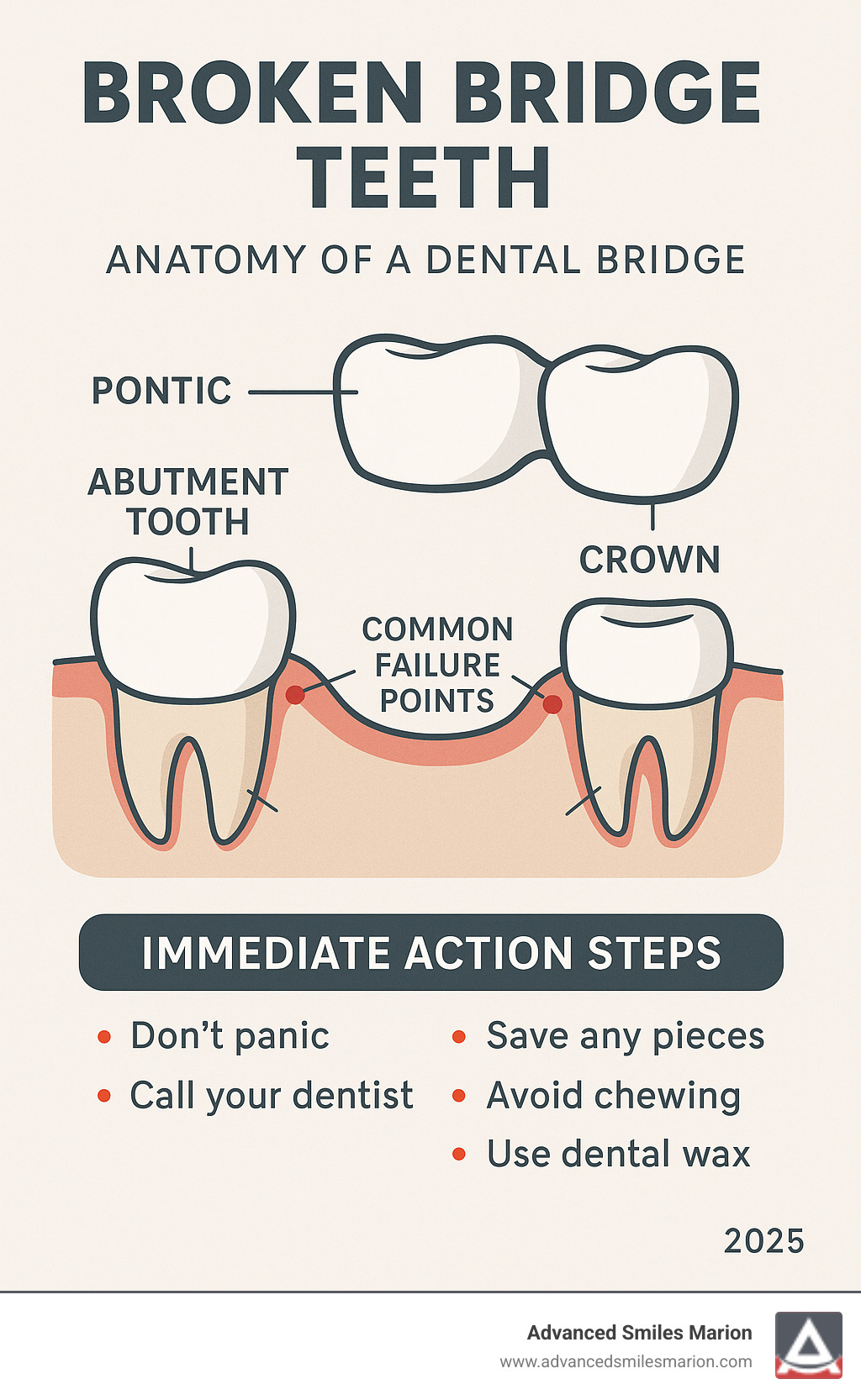
Broken bridge teeth terms to remember:
Understanding Your Dental Bridge and Why It Might Break
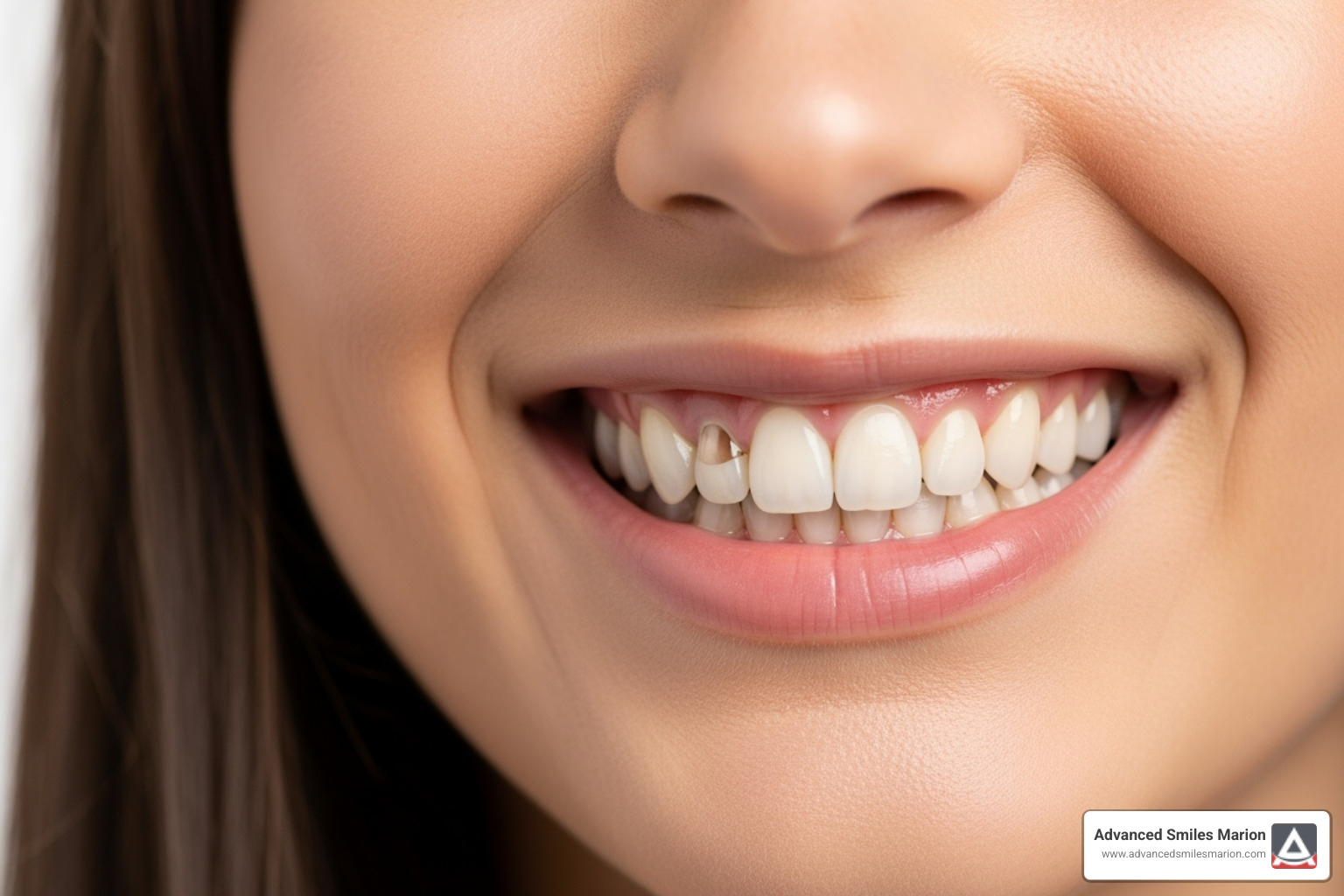
Your dental bridge is more than just a dental restoration – it's a carefully crafted solution that brings back your confident smile and comfortable chewing. Think of it as a literal bridge that spans the gap where you're missing teeth, connecting the healthy teeth on either side to support artificial replacement teeth in between.
What is a dental bridge?
A dental bridge is a fixed prosthetic device that replaces one or more missing teeth by anchoring artificial teeth to your natural teeth. Unlike removable dentures, your bridge becomes a permanent part of your mouth, cemented securely in place so you can eat, speak, and smile with confidence.
The bridge consists of several key components working together. The pontic is the artificial tooth (or teeth) that fills the gap where your natural tooth once was. On either side, abutment teeth) serve as the foundation – these are your natural teeth that have been shaped to receive crowns that will hold the entire bridge in place.
Purpose of a bridge
When you lose a tooth, your mouth doesn't just miss that one tooth – it affects your entire oral system. Replacing missing teeth with a bridge helps restore your ability to chew properly, speak clearly, and maintain the natural shape of your face.
More importantly, a bridge prevents your remaining teeth from gradually shifting into the empty space, which can throw off your bite and create additional dental problems down the road. It's like having a placeholder that keeps everything in proper alignment.
How it works
Your bridge works by distributing the forces from chewing across multiple teeth instead of leaving gaps that can cause problems. The crowns on your abutment teeth act as sturdy anchors, while the pontic in the middle handles the daily work of biting and chewing just like a natural tooth would.
Common causes of damage
Even though bridges are built to last, they face daily challenges that can eventually lead to broken bridge teeth. Wear and tear from years of chewing, grinding, and normal use gradually weakens the materials over time – especially if you have habits like teeth grinding at night.
Accidental impact from sports injuries, falls, or biting down unexpectedly on something hard can cause immediate damage like chips or cracks. Sometimes the problem develops more slowly, like when decay under crowns weakens the foundation teeth that support your bridge.
An ill-fitting bridge can create stress points that eventually lead to failure. If the bridge doesn't distribute forces evenly, certain areas bear too much pressure and can crack or come loose over time.
Lifespan
Most dental bridges serve you well for 5-15 years, though many patients enjoy their bridges for much longer with proper care. The exact lifespan depends on several factors affecting longevity, including your daily oral hygiene routine, eating habits, and whether you protect your bridge from nighttime grinding with a custom guard.
Your bridge will last longest when you brush twice daily, floss carefully around the bridge area, avoid chewing on hard objects like ice or popcorn kernels, and visit us regularly for check-ups. At Advanced Smiles Marion, our highly-educated dentists use advanced technology to monitor your bridge and catch small issues before they become big problems.
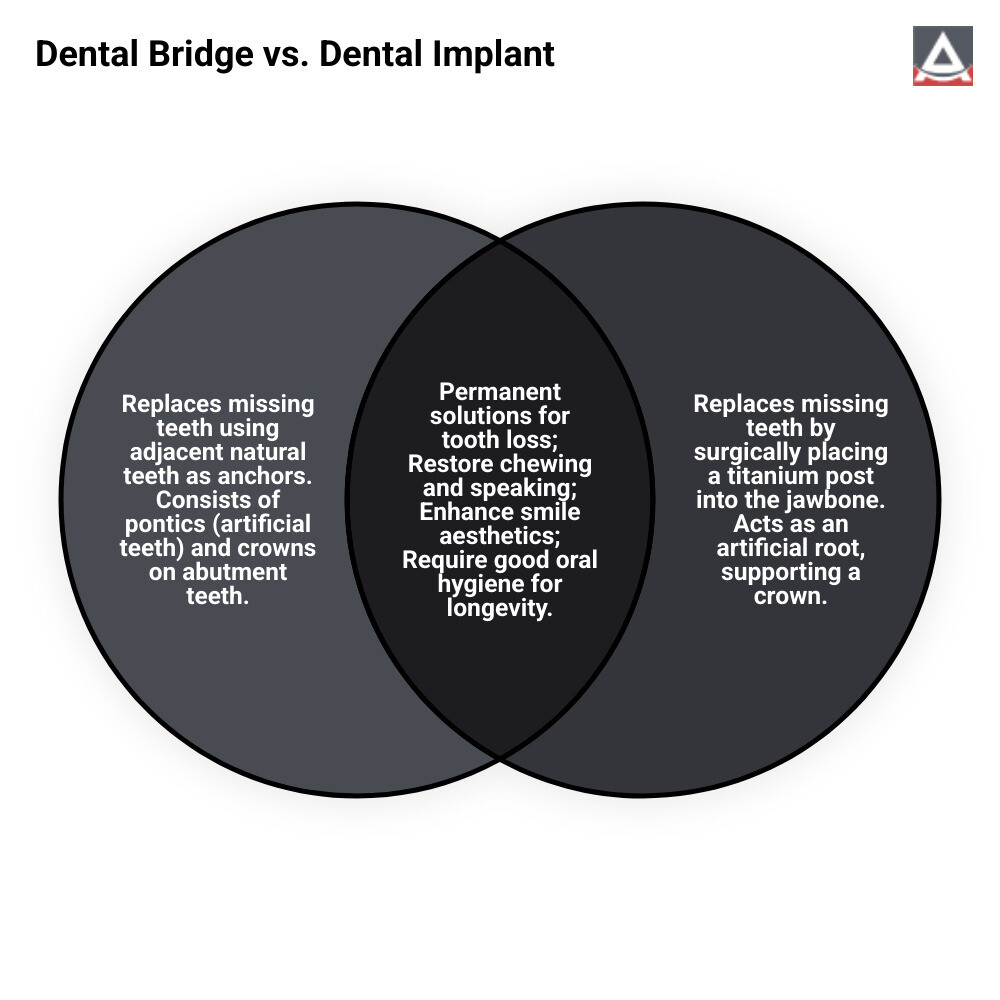
For those considering a bridge or looking to understand more about how they are structured, our guide on Understanding 3-Unit Dental Bridges offers additional insights.
7 Telltale Signs Your Dental Bridge Needs Attention

Your dental bridge is designed to be a reliable, long-lasting solution for missing teeth. But just like your car gives you warning signs before it breaks down, your bridge will often signal when something isn't quite right. Catching these early warning signs can mean the difference between a simple repair and a complete replacement.
The good news? Most bridge problems are easily fixable when caught early. Let's walk through the seven most common signs that your bridge needs some professional attention.
Looseness or wiggling sensation is probably the most alarming sign you might notice. If your bridge feels like it's shifting when you chew or even when you touch it with your tongue, don't ignore it. This usually means the cement holding your bridge in place has started to dissolve, or there might be an issue with the supporting teeth underneath. While it's tempting to see if it "settles back down," a loose bridge needs immediate attention to prevent it from falling out completely.
Pain or sensitivity around your bridge shouldn't be brushed off as normal wear and tear. You might experience sharp pain when biting down on food, or notice a dull ache that seems to come from the bridge area. Sometimes this shows up as sensitivity to hot or cold foods that wasn't there before. This type of discomfort often points to problems with the supporting teeth, like decay creeping in under the crowns or even a small crack that's developed.
Visible damage to your bridge is something you can actually see when you look in the mirror. Check regularly for cracks, chips, or fractures in the porcelain surface. Even what looks like a minor chip can quickly become a bigger problem, creating sharp edges that irritate your tongue or allowing bacteria to get into places they shouldn't be.
Changes in your bite can be subtle at first, but they're important to notice. If your bite suddenly feels "off" or uneven, or if you find yourself unconsciously favoring one side when you chew, your bridge might have shifted slightly. An uneven bite doesn't just feel uncomfortable - it can lead to jaw pain and put extra stress on your other teeth.
Bad breath or unpleasant taste that doesn't go away with regular brushing and flossing is often a sign of trapped food and bacteria around your bridge. This happens when small gaps develop between the bridge and your gums, creating perfect hiding spots for bacteria to multiply. If you notice a persistent metallic taste or bad breath that seems to come from the bridge area, it's worth having it checked.
Swollen or bleeding gums around the bridge are your body's way of telling you something isn't right. Healthy gums should be pink and firm, not red, puffy, or tender to the touch. If your gums bleed when you brush around the bridge or feel sore, it could mean the bridge isn't fitting properly anymore or that gum disease is developing in that area.
Difficulty with speech might seem unrelated to your bridge, but your teeth play a huge role in how you form words. If you suddenly develop a lisp, find yourself mumbling, or notice that certain sounds are harder to make clearly, a loose or damaged bridge could be the culprit. Sudden lisping is especially common when a bridge has shifted even slightly.
While these signs are important to watch for, some symptoms require immediate professional attention. You should call us right away if you experience severe, uncontrollable pain that doesn't respond to over-the-counter medication, significant bleeding from the gums around your bridge, or swelling of your face or gums. If your bridge falls out completely, that's definitely an emergency situation.
At Advanced Smiles Marion, our experienced dentists understand that broken bridge teeth and bridge problems don't follow a convenient schedule. That's why we make same-day emergency appointments available when you need them most. Don't wait until a small issue becomes a major problem - if you notice any of these warning signs, give us a call so we can help protect your smile.
What to Do Immediately When You Have Broken Bridge Teeth
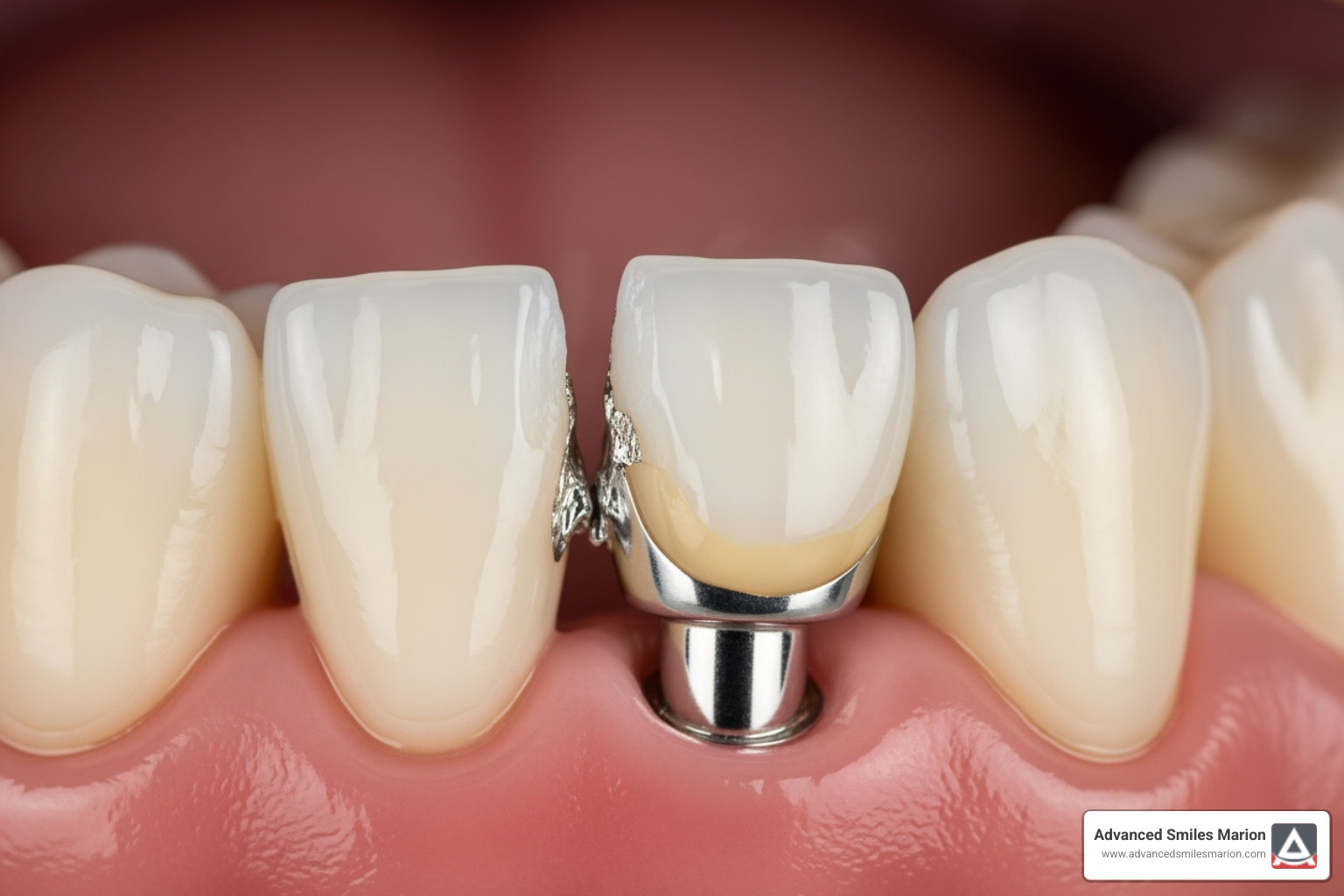
Finding you have broken bridge teeth can feel overwhelming, but don't panic. Taking the right steps immediately can make all the difference in saving your bridge and protecting your oral health. We're here to walk you through exactly what to do.
Assess the Situation: Is it a Dental Emergency?
The first thing you need to do is figure out how serious your situation is. While any damage to your bridge needs professional attention, some situations require immediate care.
Severe, uncontrollable pain that doesn't respond to over-the-counter medication is definitely an emergency. This kind of pain often signals nerve damage or infection that needs urgent treatment.
Significant bleeding from your gums or around the bridge area is another red flag. A little bleeding might be normal, but heavy or persistent bleeding requires immediate attention.
Swelling of the face or gums around your bridge is particularly concerning because it can indicate an infection. Left untreated, dental infections can spread and become serious health issues.
What constitutes an emergency? Generally, if you're experiencing severe pain, have significant bleeding, notice facial swelling, or if your bridge has completely fallen out, you need to be seen right away. A fractured abutment tooth underneath the bridge also falls into emergency territory.
Our team handles Emergency Dentist in Marion, Ohio situations with compassion and skill. We understand that dental emergencies don't wait for convenient times, which is why we often have same-day appointments available to address your urgent needs promptly.
First-Aid Steps for Broken Bridge Teeth
Once you've assessed the situation, here's what you should do while waiting to see us:
Call your dentist immediately - this is your most important step. When you call, describe the damage clearly, mention any pain you're experiencing, and let us know if you have any loose pieces. We'll guide you through the next steps and get you scheduled as soon as possible.
Carefully remove and save any loose pieces if they're easily removable. Don't force anything, but if a piece of the bridge has broken off or the entire bridge is loose enough to come out without pressure, gently remove it from your mouth. Place it in a clean container like a small plastic bag or pill bottle. These pieces help us determine the best repair approach. Never try to reattach the bridge yourself with household glue or adhesives.
Rinse your mouth with warm salt water to clean the area and reduce inflammation. Mix half a teaspoon of salt in a glass of warm water and gently swish for about 30 seconds before spitting it out. This simple step can provide comfort and help prevent infection.
Avoid chewing on the affected side to prevent further damage to your bridge, the underlying teeth, or your opposing teeth. Stick to soft foods that require minimal chewing until you can see us.
Managing Discomfort While You Wait
Even if your broken bridge teeth situation isn't a severe emergency, dealing with the discomfort can be challenging. Here's how to manage until your appointment:
Use dental wax to cover sharp edges if there's a jagged edge irritating your tongue, cheek, or gums. You can find dental wax at most pharmacies. Apply a small piece over the sharp area to create a smooth barrier and prevent further irritation.
Over-the-counter pain relievers like ibuprofen or acetaminophen can help manage pain and reduce inflammation. Ibuprofen is particularly effective because it addresses both pain and swelling. Always follow the dosage instructions on the package.
Applying a cold compress to the outside of your cheek can help if you're experiencing swelling or throbbing pain. Wrap an ice pack in a cloth and apply it to the outside of your cheek near the affected area for 15-20 minutes at a time, with breaks in between.
For additional comfort measures, you can check out our Dental Pain Remedies guide. These are temporary solutions to help you feel better until we can provide professional treatment.
The most important thing to remember is that prompt professional care gives you the best chance of saving your bridge and avoiding more complex problems. Don't hesitate to call us - we're here to help you through this challenging situation and get your smile back on track.
Professional Solutions: Repairing vs. Replacing Your Dental Bridge
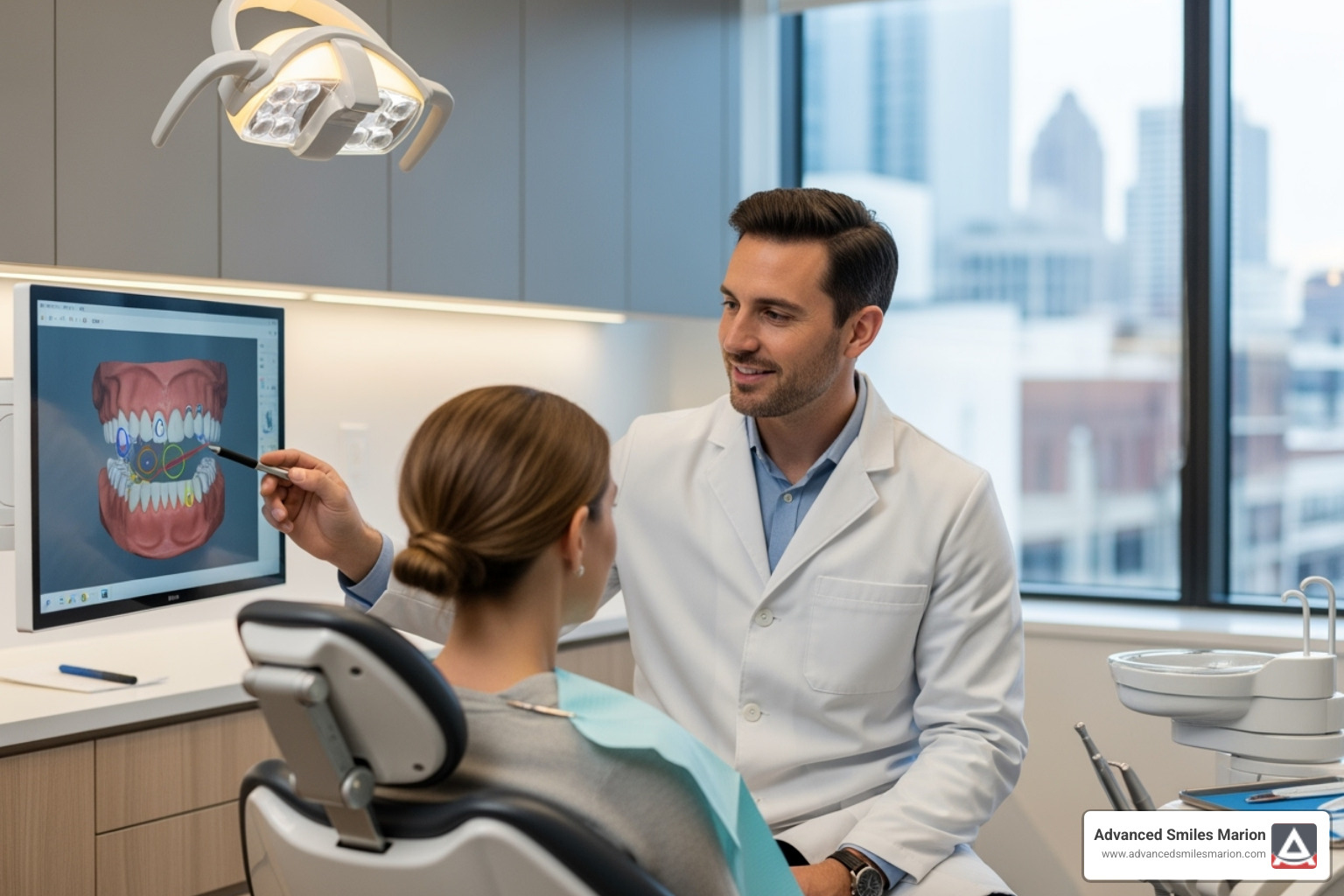
Once you're safely in our care at Advanced Smiles Marion, we'll thoroughly examine your broken bridge teeth to determine the best course of action. Our highly-educated dentists use cutting-edge technology to accurately assess the damage and discuss all available options with you. The decision to repair or replace depends on several factors, including the extent of the damage, the condition of your abutment teeth, and your overall oral health.
Can My Broken Bridge Teeth Be Repaired?
The good news is that many instances of broken bridge teeth can indeed be repaired, saving you time and cost. The possibility of repair largely depends on the type and severity of the damage.
- Re-cementing a loose bridge: If your bridge has become loose or completely fallen out, but the bridge itself is intact and the abutment teeth) are healthy and strong, we can often simply clean and re-cement the bridge back into place. This is a common and straightforward repair, particularly if the original cement simply dissolved over time.
- Repairing minor chips: For small chips or cracks in the porcelain coating of your bridge that don't compromise its structural integrity, we can often use dental bonding with composite resin. This material can be color-matched to your bridge, allowing us to repair the damaged area seamlessly, restoring both aesthetics and functionality.
- Smoothing rough edges: Sometimes, a small chip might not require a full bonding procedure but just needs smoothing to eliminate any sharp edges that could irritate your tongue or cheek.
For more detailed information on dental crowns, which are integral to bridges, you can explore our More info about Dental Crowns page.
When Is a Full Replacement the Best Option?
While repair is often our first choice, there are situations where a full replacement of your dental bridge is necessary to ensure long-term stability and health.
- Severe cracks or fractures in the bridge: If the bridge itself has a significant crack that extends through the material or compromises its structure, repair may not be sufficient. A severely fractured bridge can't provide the necessary strength and could lead to further complications.
- Damage or decay in the supporting abutment teeth: This is a critical factor. If the natural teeth that support your bridge have developed significant decay, fractures, or become weakened, they may no longer be able to support a new or repaired bridge. In such cases, we would need to address the health of the abutment teeth first.
- When an abutment tooth requires a root canal or extraction: If severe decay or infection necessitates a root canal on an abutment tooth, or if a tooth is beyond saving and requires extraction, the existing bridge will need to be removed. After treating the underlying tooth or managing the extraction site, a new bridge (or an alternative solution) would be necessary.
Modern Alternatives to Traditional Bridges
If a replacement is needed, we can craft a new, custom-made bridge custom to your exact specifications. However, we also offer advanced alternatives that provide superior stability and longevity, such as dental implants.
- Upgrading to Dental Implants: A Permanent Solution: Dental implants are often considered the gold standard for tooth replacement. They involve surgically placing a titanium post into your jawbone, which acts as an artificial tooth root. This provides unparalleled stability and helps preserve jawbone density. An average cost for a single endosteal dental implant at our practice is about $4500. For multiple missing teeth, an implant-supported bridge can be used, where the bridge is anchored to implants rather than natural teeth. This eliminates the need to prepare adjacent healthy teeth and offers exceptional durability.
Here's a quick comparison to help you understand the differences between a new dental bridge and a dental implant:
| Feature | New Dental Bridge | Dental Implant |
|---|---|---|
| Support | Relies on adjacent natural teeth (abutments) | Supported by a titanium post surgically placed in jawbone |
| Tooth Prep | Requires shaping of adjacent healthy teeth | No impact on adjacent teeth |
| Bone Health | Does not stimulate jawbone, potential for bone loss | Stimulates jawbone, helps prevent bone loss |
| Longevity | Typically 5-15 years with proper care | Can last a lifetime with proper care |
| Maintenance | Requires special cleaning under pontic | Cleaned like natural teeth |
| Cost | Generally lower upfront for a traditional bridge | Higher initial investment, but long-term value |
We will thoroughly discuss all your options, considering your oral health, preferences, and budget, to help you make the most informed decision for your smile.
Protecting Your Smile: Long-Term Care and Prevention
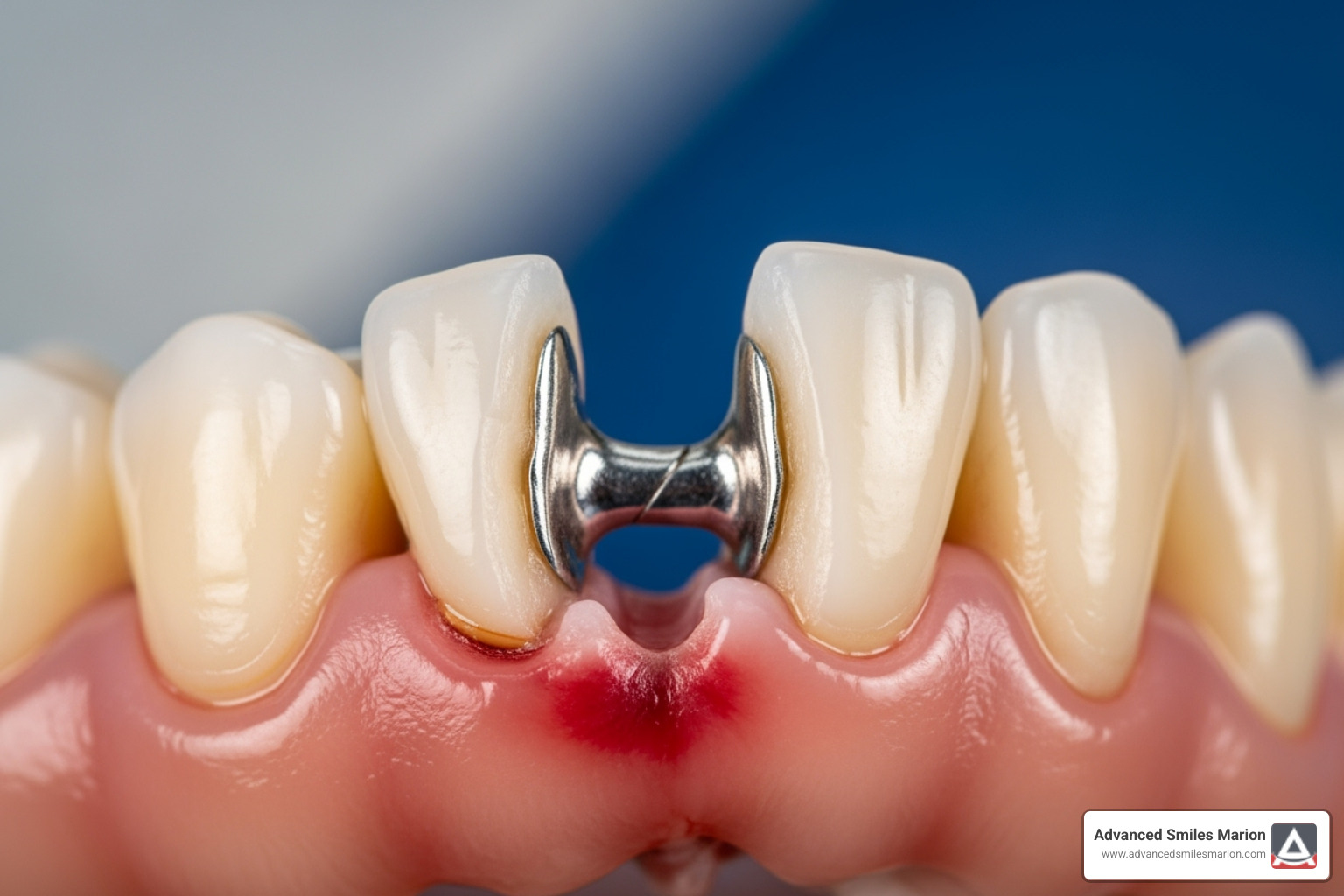
Once your broken bridge teeth have been expertly repaired or replaced, you'll want to protect that investment for years to come. Think of your dental bridge as a luxury car - it performs beautifully when properly maintained, but neglect it, and you'll face costly repairs down the road.
The good news? With the right care routine and some smart habits, your bridge can serve you faithfully for many years. Let's explore how to keep your smile healthy and strong.
A+ Oral Hygiene for Bridge Longevity
Your daily oral hygiene routine becomes even more important with a dental bridge. The key is being thorough and consistent with your care.
Brushing twice daily with a soft-bristled toothbrush and non-abrasive toothpaste is your foundation. Pay special attention to where your bridge meets your gums - this is where plaque loves to hide. Think of it as giving your bridge a gentle daily spa treatment.
Flossing with a floss threader or water flosser is crucial because traditional flossing can't reach under the pontic (the artificial tooth part of your bridge). A floss threader acts like a needle, helping you guide regular floss underneath your bridge to remove trapped food and plaque. Many of our patients find water flossers easier to use and just as effective for cleaning under the pontic.
The area under your bridge needs special attention because bacteria and food particles can accumulate there, potentially leading to decay on your supporting teeth or gum disease. This hidden area is often where problems start, so don't skip this step!
Using non-abrasive toothpaste protects the surface of your bridge from scratches that could harbor bacteria. Your bridge material is durable, but harsh abrasives can wear it down over time.
Scientific research on oral hygiene consistently shows that excellent daily care dramatically reduces your risk of dental problems and supports overall health.
Smart Habits to Prevent Damage
Beyond daily cleaning, certain lifestyle choices can make or break your bridge's longevity - literally.
Avoid chewing hard items like ice, popcorn kernels, and hard candy. These innocent-looking culprits can crack porcelain or loosen your bridge faster than you'd think. We've seen too many emergency visits from patients who thought "just this once" wouldn't hurt.
Don't use your teeth as tools - resist opening packages, holding objects, or biting fingernails with your bridge. Your teeth aren't scissors, and your bridge isn't a bottle opener. This puts unnatural stress on both your bridge and supporting teeth.
If you grind your teeth (bruxism), wearing a custom nightguard is essential. Teeth grinding can destroy even the strongest bridge over time. A custom-fitted nightguard from our office provides comfortable protection that actually gets used, unlike one-size-fits-all drugstore versions.
Partnering with Your Dentist for a Lasting Restoration
Your partnership with our team at Advanced Smiles Marion is crucial for long-term success. We're not just here for emergencies - we're your partners in prevention.
Regular check-ups and cleanings allow our highly-educated dentists to monitor your bridge using cutting-edge technology. We can spot tiny issues before they become big problems, potentially saving you from dealing with broken bridge teeth again. During these visits, we examine the fit of your bridge, check for wear patterns, and ensure your supporting teeth remain healthy.
Our Dental Wellness Plan makes preventative care affordable for patients without insurance. This plan allows individuals and families to get the yearly dental care they need at a discounted price, including regular check-ups and two fluoride treatments per year. It's designed to make prevention accessible, because we believe everyone deserves a healthy smile.
Your smile represents a significant investment in your health and confidence. At Advanced Smiles Marion, we're committed to helping you protect that investment through our advanced dentistry services. Our unique laser treatments for TMJ pain, canker sore healing, and periodontal disease represent the latest advances in dental care, ensuring you receive world-class, affordable solutions custom to your needs.
Preventing broken bridge teeth is always easier and less expensive than repairing them. With proper care and our expert support, your bridge can provide years of confident smiles and comfortable chewing.

Panel 6: Hope on the Horizon
The mural culminates in a vision of Marion's future, one marked by technological advancements, sustainability, and community togetherness. The cardinal, elevated above a futuristic cityscape, looks ahead with optimism, its backdrop a blend of colors signifying hope.
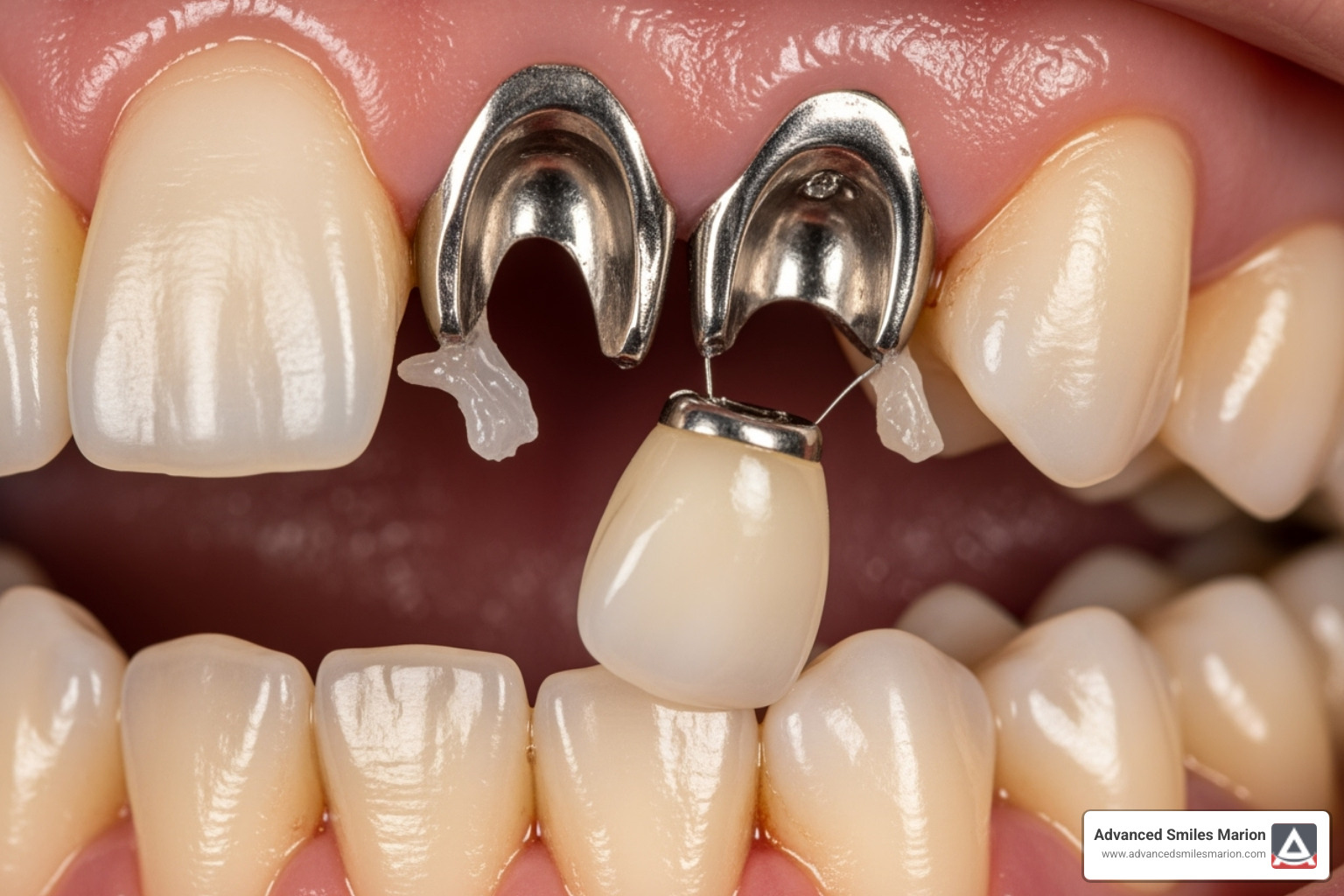
Get in touch
Have any questions? Want to learn more?

